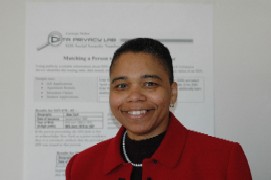Distinguished Career Professor of Computer Science, Technology
and Policy at Carnegie Mellon University, founder and director of the Data Privacy Lab,
and an elected fellow of the American College of Medical
Informatics, with almost 100 academic publications, 2 patents, citations
in the Federal Register for 2 regulations, and 3 company spin-offs. I have received professional
and academic awards, and testified before federal and international government
bodies. In 2009, through a national GAO search, I was appointed to the privacy
and security seat of the Federal Health Information Technology Policy Committee.
Historically, I have made numerous cross-disciplinary contributions to
privacy technology having significant scientific influence and
real-world impact. Scientific American profiled my earlier work
(profile).
My greatest impact has been in medical privacy (
medical informatics,
policy and law).
My most cited statistic is "87% of the
U.S. population is uniquely identified by {date of birth, gender,
postal code}" [cite].
My most cited academic work is
k-anonymity.
An index of
my work, across disciplines and scientific areas, appears
here
and a brief summary appears below. Also, here is my
bio
and
CV.
I began professional life as CEO of a network of computer start-ups. During those 10 years,
I developed innovative algorithms that seemed to push the bounds of computing at the time.
A particular emphasis was on semantic learning tasks.
My intellectual property from those early days is included in this list of
artifacts.
In my earliest academic work, I created systems that automatically learn
strategic and sensitive information from data, and the converse, I
created systems that control what can be learned. Most often, this
related personal identity to seemingly innocents facts
(re-identification and de-identification). The broader goal is to
create systems that give guarantees that identity cannot be learned
("anonymity") while still making sure the results remain
useful.
In the 2000's, I worked with computer scientists who pioneered
privacy-invasive technologies and scholars who designed related
policy, believing these groups were in the best positions to solve
privacy-technology clashes through design. My approach was to identify
a privacy-technology clash within a community, formulate a privacy
problem statement, and then offer a solution to the problem as an
exemplar to seed privacy-preserving work within the originating
community.
In computer science, these were:
medical informatics,
database security,
surveillance,
vision,
and
biometrics.
Related communities outside computer science were:
policy and law,
and
public education.
As part of an extended sabbatical from Carnegie Mellon, I began my "privacy rethink" at
Harvard in 2009. The goal is to replace the 3 historical pillars of
privacy (consent, notice, and de-identification) with new
technology-powered mechanisms that jointly provide a privacy fabric
appropriate for today's setting. We want society to reap the benefits
of emerging technologies while enjoying privacy protection. Testbeds
for these new systems (MyDataCan,
theDataMap, and more) are rolling
out over the next months, so stay tuned.
